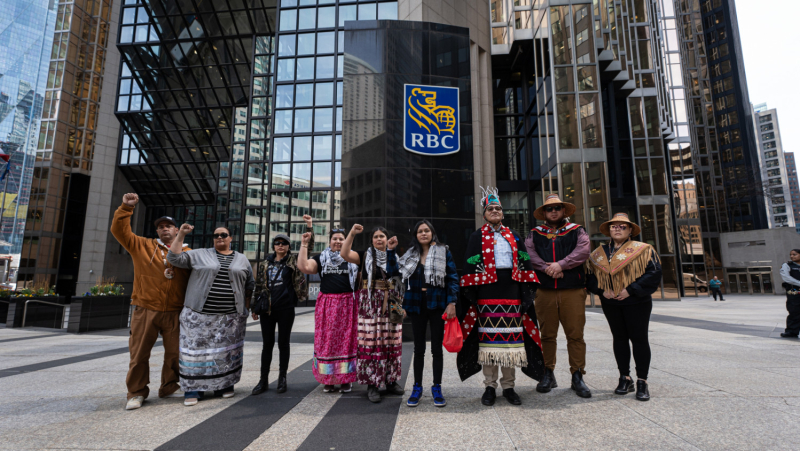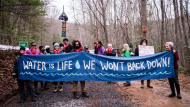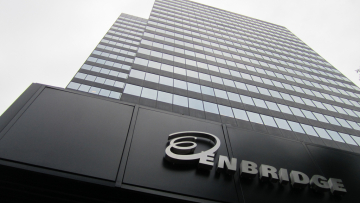RBC on the defensive at its AGM as movement-led demands yield wins
Lindsay Meiman, Climate Finance Media Director, lindsay@stand.earth, +1 914 844 4950 (EST)

Lindsay Meiman, Climate Finance Media Director, lindsay@stand.earth, +1 914 844 4950 (EST)
With testimony inside the room from Indigenous and Black land defenders, and hundreds rallying in the rain outside of Royal Bank of Canada’s annual general meeting (AGM) today, RBC conceded to some demands for Indigenous rights and climate change, as the bank nevertheless continues to pump billions of dollars into fossil fuel projects across Canada and around the world, violating Indigenous sovereignty and human rights. This comes amidst a looming shareholder showdown, growing protests at branches and offices across Canada, and a digital campaign talking directly to its employees.
Chief Na'Moks, Wet'suwet'en Hereditary Chief: "While RBC has added respecting Free Prior Informed Consent to its Human Rights statement, and expanded its Environmental and Social Risk policy on Indigenous rights, being true to that means never financing a project like Coastal Gas Link again. A pipeline that continues to threaten the freedoms and democracy of Indigenous peoples and all Canadians. This story and RBC's role in Coastal Gas Link is now known around the world. We are meeting and sharing with communities threatened by projects like this. RBC's costs for financing fossil fuel projects on Indigenous lands will only continue to rise without taking bold action to respect our sovereignty and our rights."
Vanessa Gray, Aamjiwnaang First Nation: "By failing to recognize the inherent vital role of Indigenous teachings and traditional land use, Royal Bank of Canada is more interested in wasting time rewriting greenwashed hypocrisy while we watch our climate crumble under the pressure of the unsustainable exploitation and extraction this corporation is financing. This is an active threat to our Indigenous and everyone's human rights. As Indigenous people, was have protected our sacred knowledge through unimaginable genocide, our collective strength exceeds the cost RBC is willing to pay for our future."
Dozens of Indigenous and Black land defenders and allies from across Turtle Island (North America) attended Thursday’s Annual General Meeting where they were met with interruptions, censorship, and silencing from the RBC board despite the importance of the questions raised around human rights, Indigenous sovereignty and its reckless investments in fossil fuels.
Last year at its meeting in Saskatoon, delegates were manhandled and segregated amid increased police surveillance and private security. The Union of British Columbia Indian Chiefs (UBCIC) with the British Columbia Government Employees Union (BCGEU) as well as Stand.earth supportng the New York City Comptroller, put forward shareholder resolutions targeting RBC’s Indigenous rights and climate change policies.
Through sustained pressure and negotiations at the table, RBC agreed to the following:
- Indigenous Rights: RBC has expanded its Environmental and Social Risk process, examining the impacts of its clients activities on Indigenous lands and communities (I-ESR), amended its human rights statement to invoke internationally recognized standards for Indigenous rights and agreed to include a review of its new I-ESR policies in its racial equity audit to be completed in 2025.
- Climate Change: RBC will regularly disclose its ratio of clean energy supply financing to fossil fuel extraction financing (Energy Supply Ratio) and its underlying methodology. This agreement is a critical step to better assess the role banks play in the climate transition, and whether or not they are on track to meet their emissions reduction commitments.
As a result, those shareholder resolutions were withdrawn.
Grand Chief Stewart Phillip, Union of British Columbia Indian Chiefs (UBCIC): "RBC is not off the hook by any means. Policies are one thing but what matters is action. We will closely monitor RBC's progress. Respecting FPIC is not an optional standard that only applies when consent is granted. It must also include the right to say 'no' and have that respected."
Richard Brooks, Stand.earth Climate Finance Director: "Last year, RBC segregated Indigenous and Black leaders, this year it attempted to censor frontline voices. But we were heard loud and clear. RBC can't outrun the fires and floods with incrementalism and greenwashing while still pouring billions into climate chaos-causing fossil fuels. Together, the many will defeat the dirty money."
Hundreds concerned about RBC’s regressive policies that are harming the planet and violating human rights around the world turned out to rally outside the AGM in Toronto and featured speakers from Wet’suwet’en Land Defenders, the Palestinian Youth Movement, and Keepers of the Water. Participants marched around the Toronto Congress Centre where shareholders gathered, and were met by a heavy police and private security presence. The rally featured Indigenous drumming, a custom soundscape, and a 15 foot inflatable of RBC CEO Dave McKay.
RBC continues to be under investigation by Canada’s Competition Bureau over its climate advertising campaign for being allegedly misleading or ‘greenwashed’, and is facing a securities complaint over allegations of misleading investors through its use of terms like ‘sustainable finance’, without providing the requisite data.
RBC has bankrolled at least US$ 250 billion in fossil fuel deals since 2016 and has among the worst clean to dirty energy financing ratios in the world according to Bloomberg NEF. In 2022, for every $1 pumped into fossil fuels, a mere $0.37 was invested in clean energy. For banks to play its role in limiting global warming to 1.5 degrees celsius that ratio would need to be 4:1 in favour of clean energy.
RBC’s own 2030 climate commitments fall well short of what’s needed for action on the climate crisis from Canada’s largest financier of fossil fuels and fail to meet the bar set by the Canadian government for emissions reductions by 2030 (e.g. a 42% reduction in absolute emissions from oil and gas by 2030).
Celine Isimbi, student with the University of Waterloo and an organizer with Change Course, said: "RBC is putting the lives of frontline communities at risk and putting young peoples’ futures in jeopardy, all while funding “sustainable finance” programs and competitions on campuses to greenwash its actions. Students see through it and they’re taking action: from major student unions representing hundreds of thousands of students calling on big banks to stop funding these detrimental projects, to students permanently shutting down RBC branches on campuses, students are taking a stance against Canada’s biggest banks."
Dr. Crystal Cavalier-Keck, CEO and Co-Founder of 7 Directions of Service, Citizen of the Occaneechi Band of the Saponi Nation; fighting the Mountain Valley Pipeline financed by RBC, said: “Violence on the land is violence on our bodies. Yet Royal Bank of Canada still underwrote the $27 million bond for the Mountain Valley Pipeline, which is a death sentence for many in our communities. Our powerful coalition — from Appalachia to the Yintah — will continue to stand up to protect the most vulnerable among us, and our Great Grandmother Earth.”
Tara Houska, attorney and founder Giniw Collective, Couchiching First Nation citizen; Involved in Enbridge Line 3 opposition (RBC has financed Enbridge) said: “Wildfire season is year-round, grow seasons are chaos, and clean freshwater grows ever more precious — yet here’s Royal Bank of Canada as one of the top financiers of fossil fuels in the world. Many Indigenous cultures demand we stand up for our children, for the earth. We’ve cost your clients and shareholders untold billions in delays, legal fights, and reputational damage for targeting the world’s last healthy ecosystems. It’s beyond time to uphold human rights and respect our children’s right to a habitable planet.”
Sharon Lavigne, community organizer and founder of Rise St. James, said: “For the sake of environmental and racial justice, we are bringing our message from St. James, Louisiana — what’s often called ‘cancer alley’ — straight to RBC’s shareholder meeting: stop financing deadly petrochemicals in the Gulf South. We are connecting our struggles to fight for the clean, healthy, and safe future we all deserve.”
Rawan Habib, Palestinian Youth Movement, said: “We know that RBC’s investments in settler colonialism extends beyond so-called Canada as it continues to bankroll genocide in Palestine and around the world. RBC is currently funding some of the largest weapons manufacturers that are actively targeting people in Gaza and across Palestine. RBC must stop investing in genocide.”
Juan Mancias, Tribal Chair, Carrizo/Comecrudo Tribe of Texas, said: “RBC’s history and present actions are riddled with false solutions and bad investing decisions that do not protect our future for generations to come. They are accomplices in crimes against humanity and tribal erasure by stealing land sacred to the original people of those lands, pillaged by fossil fuel extraction and with the financial backing of RBC.”
Katherine Hahn, Gulf Fossil Finance Organizer, Texas Campaign for the Environment, said: “Royal Bank of Canada is funding US nuclear weapons companies and artificial intelligence and surveillance for the Israeli military and US border communities. RBC also funds all but one of the current LNG export terminals in Texas and Louisiana. It’s an utter joke that Royal Bank of Canada claims to be a climate leader, remaining the #1 fossil funder in Canada and having actually increased financing for fossil fuel expansion last year. The Gulf South will continue coming back to keep our business in RBC’s face as it continues to keep all its racist, dirty profiteering in ours back home.”
Jason Crazy Bear Keck, Co-Founder of 7 Directions of Service, said: “We as Indigenous First Nations and historically exploited, targeted peoples of color, along with our allies and accomplices who are witnessing the damages of legacy pollution on our Frontline communities, find it unfathomable that we must continue to explain the unsustainability and evident climate chaos that only took a little over a century to impose on the global majority for the irresponsible and inflated profits of a select few. We are here taking responsibility and holding accountable those who know better but continuously fail to do better. We are asking all peoples to stand together with us for our own future generations and the future of all our non-two legged relatives, as well as the Earth herself.”
Laura Ullmann, Head of Climate, Greenpeace Canada, said: “The tides are turning as together we rise. The fossil fuel projects RBC continues to fund are violating Indigenous rights and causing climate chaos today. Taking action means ending the financing of new or expanded fossil fuel production, using the IEA Net Zero scenario as the guide for their climate strategy, immediately presenting reduction targets and plans to halve financed emissions by 2030, and ensuring all funded projects uphold, affirm and respect Indigenous rights.”
Republished from the original news article on the Fossil Free RBC website here.



